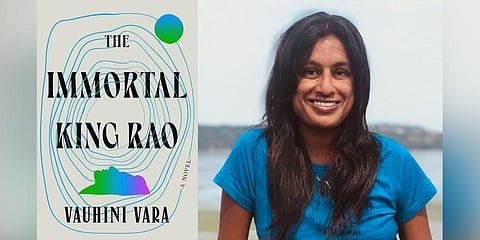

If you have the stomach for fiction that blends a critique of the caste system with a deep dive into techno-capitalism, give this book a chance to surprise you. It revolves around the rags-to-riches story of King, an enterprising Dalit man from a family of coconut farmers in India, who moves to the US as a student and ends up becoming a highly successful tech CEO in the Silicon Valley. The circumstances of King’s birth are tragic. His mother detests him even before she sees his face because he is the product of rape. She dies during childbirth and King is raised by her sister.
Vauhini Vara, who identifies herself as a technology reporter from a Dalit background, is at her finest when describing life on the coconut plantation, for which she relies on stories of family and friends, who lived in the rural coconut grove that is her paternal ancestral home.
One of the themes explored in this novel is the American dream: “If you’re smart, ambitious and talented, you’re rewarded”. King has to face several hardships in the US––from being “psychically unprepared” for American winters to dealing with office politics, from scrambling for comfortable accommodation to being exploited for his intellectual gifts––but his faith in the so-called American dream is undeterred.
King ends up marrying Margie, an unfulfilled artist, and the daughter of King’s academic advisor. She has a mind for business, so she plays a key role in helping King realise his dream, but she also plays him to serve her own interests. The author brings out the nuances of their relationship through her prose, which is free of unnecessary stylistic flourishes.
The nerd in you might enjoy the historical nuggets woven into the narrative. For instance, to explain what makes humans distinct from other species, Vara invokes Scottish philosopher Adam Ferguson: “Our extraordinariness has to do with what we’ve accomplished together; our defining characteristic is being able to pass something off of our lived experience from one human to another, thus ensuring our advancement as a species.” This idea is deeply connected to King and Margie’s grand plan. They build computers that people can use to store information for their descendants. Read this book to know more about Athena, who is not only their daughter but also their invention.
Vara skilfully examines the human urge to document and the fear of exposure. She builds a compelling portrait of ambition, and its pitfalls, and offers a vision of where we might be headed with life-extending technologies, the paranoia around migration in an age of globalisation, and our hope that our planet can be saved from the consequences of our own actions.
The Immortal King Rao
By: Vauhini Vara
Publisher: HarperCollins
Pages: 384
Price: Rs 699